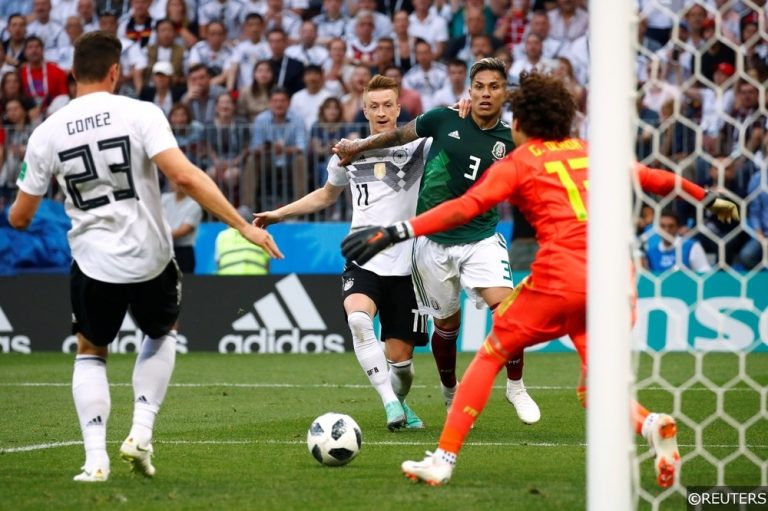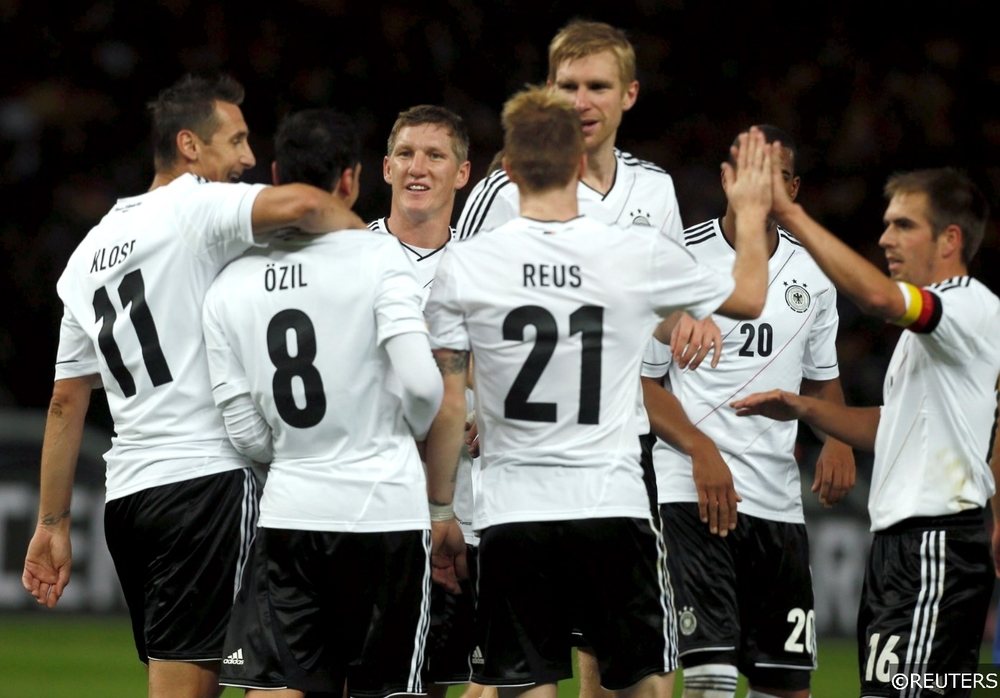
A lifelong Birmingham City fan, Tom relocated to Germany for five years after graduating from university, where his interest in the Bundesliga developed. He began writing about and betting on German football for FST in 2016. He's also an avid fantasy football player and closely follows the Premier League and European competitions.
For a team whose long running World Cup success has been rooted in the strong effort of the collective, the process of disintegration Germany suffered at the hands of Mexico on Sunday was more shocking than the defeat itself. Juan Carlo Osorio’s side executed a perfect succession of quick, counterattacking blows that took Germany by surprise and shattered everything we thought we knew about the reigning champions. A repeat of 2014’s World Cup win now looks infinitely more difficult.
Joachim Löw’s loyalty to players like Sami Khedira and Mesut Özil not only cost die Mannschaft a result in their World Cup opener, but it has now given every other team in the tournament a blueprint with which to work with. Germany’s style of play can be exploited. Löw’s men are human too. A lack of cohesion and communication between the midfield and defense was a huge and obvious problem (where, in fact, was the midfield?), but the reigning champions didn’t exactly look dangerous going forward either.
Germany were out of sync and players who look as if they can no longer provide played with an arrogance as if they expected Mexico would eventually just fold to their superiority. Khedira, more than any Germany player, had little to no positive effect on the game. Only when he was substituted off and Özil played in a deeper role did Germany look more dangerous. Late on we saw some resistance and willingness to fight for a point, but it was far from the performance we expected of the 2014 champions.
Change is clearly needed, but is Marco Reus the answer?
Free Super Tips looks into the reasons why Germany should put their faith in wildcard Marco Reus
Read more: How did Mexico beat Germany in the Group F opener?
His Scoring Record
Germany since 2011: 32 caps – 9 goals
Senior career since 2006: 282 appearances – 107 goals
He scores goals. It’s that simple. Why else would Joachim Löw have taken him to Russia?
After an injury ruled him out for the first half of the 17/18 season, the 29-year-old enjoyed something of a renaissance, scoring seven goals in eleven matches for Borussia Dortmund to help them secure Champions League football for next season. His overall record in the Bundesliga stands at 99 goals and 64 assists over 233 matches – impressive numbers by anyone’s standards. However, these numbers are even more impressive when taking into account the amount of times he’s had to work his way back to 100% following a long spell on the sidelines.
Reus is arguably Germany’s most technically gifted footballer and Löw himself even said he was “an incredibly skillful and intelligent player, a real handful for the opposition”. With his ability to also strike a free-kick better than any other teammate, he looks the obvious candidate to mix things up for Germany’s upcoming fixtures against Sweden and South Korea. Reus is, at last, set to shine on the biggest stage of all.
FUN TRIVIA: Marco Reus is one of just three players to have scored against all 18 clubs present in the 2017/18 Bundesliga season at some point in his career.
His Versatility
Another reason that Reus is a key component in Joachim Löw’s squad is his versatility – something that Leroy Sané was unable to offer. He has spent most of his career on the left wing, but he has shown in the past just how comfortable he is in playing a more forward role. Reus was played up front in his most prolific Bundesliga season (2011/12), where he netted a massive 18 goals in 32 appearances for Borussia Monchengladbach. He also played up front alongside Pierre-Emerick Aubameyang when he won his first major trophy, the DFB Pokal (German Cup) in 2017.
Most recently, Reus replaced injured Dortmund teammate Michy Batshuayi for the final month of the 17/18 season, scoring four goals over his last four outings. It would be harsh to suggest that he should be replacing Timo Werner up front given the lack of service the youngster was given against Mexico, but with Reus having proven himself invaluable as a focal point of the attack in the past, why not now?
Read more: Why was Leroy Sané left out of Germany’s World Cup squad?
His Confidence
Go through a list of the Bundesliga’s best forwards and you’ll see the names Robert Lewandowski and Mario Gomez who – like Reus – have managed to score at least once against all 18 Bundesliga clubs. However, these players are through and through strikers whose only task is to score goals. It is, therefore, a surprise to see Reus’ name on that list too, especially as he’s made significantly fewer appearances than them both.
If there is one man who has nothing to lose in Russia then, it’s Marco Reus. At 29 years of age, he’s gearing up for just his second major tournament with Die Mannschaft, having missed both the 2014 World Cup and Euro 2016 due to injury. Reus has been praised for his many footballing talents throughout his 12 year career so far – and rightly so – and will no doubt take pride in being described as Germany’s “secret weapon”.
FUN TRIVIA: Reus hasn’t played more than 30 league matches in a season since 2012/13.
His Experience

Having just turned 29 before the start of the 2018 World Cup, Marco Reus finds himself just within what’s considered a “prime age” for footballers. Philipp Lahm was 30 when he captained Germany to World Cup glory four years ago; Cristiano Ronaldo was 31 when he led Portugal to their Euro 2016 triump; the legendary Franz Beckenbauer was 28 when he won the World Cup in 1974; and Lothar Matthäus was also 29 when he captained Germany to glory at Italia ’90.
Reus should therefore have the perfect balance of fitness, technical quality and mental strength on the pitch, providing he can avoid the sorts of minor injuries that have plagued his career. His resume might not be as impressive as some of the up-and-coming youngsters, but his experience of having played with some of the best German players of this generation has to count for something. Reus has everything going for him. Why not take advantage of that?
Read more: Can Germany win back-to-back World Cups?
His Destiny
Reus has to be one of the unluckiest footballers of his generation. As Germany celebrated their 2014 World Cup win, Reus sat at home nursing a torn ankle ligament he sustained in their final pre-tournament warm-up match against Armenia. He could only tune in from afar as Mario Götze scored the winning goal in Rio de Janeiro’s Maracana, and though Götze’s post-match homage to his friend was touching, the disappointment of missing out must have been devastating.
Unsurprisingly, injury problems meant Reus did not feature in a single 2018 World Cup qualifier either – in fact, his appearance off the bench in the recent friendly with Austria was his first with Germany since all the way back in March 2016 – but he clearly hadn’t lost his touch. Reus needed just eight minutes to tee up RB Leipzig’s Timo Werner for the opening goal.
Some would say that a shot as a key player in a major tournament is the least this mercurial talent deserves.
Congratulation to the whole Team! Your Dream has Come true! And Thanks to my bro for your gesture:) Believe ✌ pic.twitter.com/Cgb6xeDq8T
— Marco Reus (@woodyinho) July 14, 2014
Let us know if you would play Marco Reus in Germany’s starting 11 over on our Twitter page.
Follow Free Super Tips on Twitter to stay up to date with our daily tips and predictions or browse more football content on our website:


